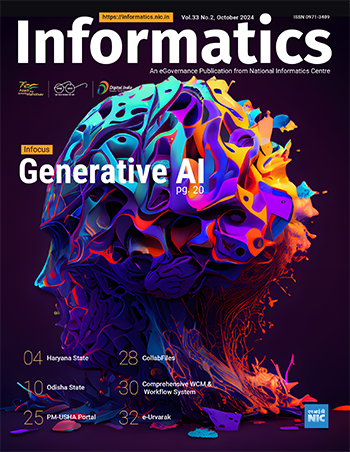Editorial
As the world embraces digital transformation, developing nations like ours are at a critical juncture in modernizing governance. Government apps are quickly becoming the go-to tools for public service delivery, and their effectiveness is directly linked to the underlying technologies that drive them. Among these technologies, two stand out for their ability to shape the future of governance: artificial intelligence (AI) and cybersecurity. Together, they form the backbone of smart, efficient, and secure government apps, which are essential for addressing the needs of a diverse and growing population.
AI is fundamentally transforming how government services are delivered. With AI, government apps can now offer personalized, data-driven services to individual needs. For instance, AI can analyze a citizen’s data to recommend welfare schemes, healthcare advice, or financial services. This level of personalization is particularly crucial in a country as diverse as ours, where one-size-fits-all approaches often fall flat.
Beyond personalization, AI automates routine tasks, from processing applications to answering citizen queries. Chatbots, powered by AI, are increasingly becoming the first point of contact for citizens seeking government services, offering instant assistance 24/7. This automation not only speeds up service delivery but also reduces the burden on human administrators.
AI is also enabling predictive governance. In areas such as health, AI can predict disease outbreaks, helping governments take preemptive action. In infrastructure, AI-driven traffic management systems can optimize urban planning and reduce congestion. In short, AI is helping governments be more proactive, efficient, and responsive to the needs of their citizens.
As AI powers efficiency, cybersecurity ensures trust. With the increasing reliance on government apps for essential services, securing these platforms against cyber threats is critical. Cybersecurity measures such as encryption, multi-factor authentication, and real-time monitoring safeguard sensitive citizen data and protect against unauthorized access. In a world where data breaches and cyberattacks are a constant threat, strong cybersecurity frameworks are essential for building and maintaining public trust. Without this trust, the adoption of digital government services could be hindered, limiting the success of digital governance initiatives.
When AI and cybersecurity come together, they form a powerful combination that can transform governance. AI can not only improve services but also enhance security. For example, AI systems can monitor user behavior and detect anomalies that may indicate cyberattacks. This real-time threat detection, combined with robust cybersecurity measures, ensures that government apps are both efficient and safe.
Despite the immense potential, concerns around the ethical use of AI and the shortage of cybersecurity professionals need urgent attention. Governments must invest in both technological infrastructure and human capital to realize the full benefits of AI and cybersecurity.
AI and cybersecurity are the twin pillars of future governance. Together, they are revolutionizing how government services are delivered and protected, making governance more efficient, inclusive, and secure. For a developing nation like ours, these technologies represent the way forward, ensuring that digital progress benefits every citizen and builds a more equitable and secure.
-Editor-in-Chief

